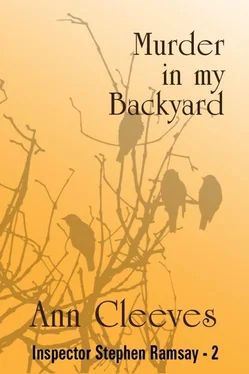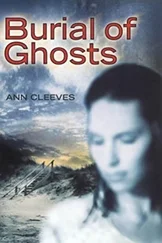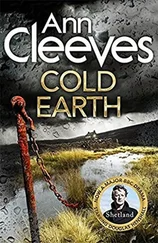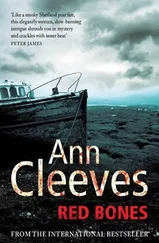Ann Cleeves - Murder in My Backyard
Здесь есть возможность читать онлайн «Ann Cleeves - Murder in My Backyard» весь текст электронной книги совершенно бесплатно (целиком полную версию без сокращений). В некоторых случаях можно слушать аудио, скачать через торрент в формате fb2 и присутствует краткое содержание. Жанр: Детектив, на английском языке. Описание произведения, (предисловие) а так же отзывы посетителей доступны на портале библиотеки ЛибКат.
- Название:Murder in My Backyard
- Автор:
- Жанр:
- Год:неизвестен
- ISBN:нет данных
- Рейтинг книги:5 / 5. Голосов: 1
-
Избранное:Добавить в избранное
- Отзывы:
-
Ваша оценка:
- 100
- 1
- 2
- 3
- 4
- 5
Murder in My Backyard: краткое содержание, описание и аннотация
Предлагаем к чтению аннотацию, описание, краткое содержание или предисловие (зависит от того, что написал сам автор книги «Murder in My Backyard»). Если вы не нашли необходимую информацию о книге — напишите в комментариях, мы постараемся отыскать её.
Murder in My Backyard — читать онлайн бесплатно полную книгу (весь текст) целиком
Ниже представлен текст книги, разбитый по страницам. Система сохранения места последней прочитанной страницы, позволяет с удобством читать онлайн бесплатно книгу «Murder in My Backyard», без необходимости каждый раз заново искать на чём Вы остановились. Поставьте закладку, и сможете в любой момент перейти на страницу, на которой закончили чтение.
Интервал:
Закладка:
She looked at him seriously. “ Why do you want to speak to Ian?” she asked. “He’s got nothing to do with this.”
“He’s not in any trouble,” Ramsay said. “He might just have seen something.”
“He’s not at school,” she said. “ He’s upstairs. He’s got the flu.”
“Can I speak to him? It won’t take long. You can be present if you want to.”
She shrugged and disappeared from the room. She came back sometime later followed by a teenage boy. He was pale and seemed genuinely unwell. Ramsay recognised him as one of the boys who had passed him while he was standing at the bus shelter on the first night of the investigation. He sat next to the big, old-fashioned range and huddled into his polo-neck sweater.
“I’ll get on with this washing up,” Celia said, “while you talk to him. You won’t mind that?”
“No,” Ramsay said. “Of course not.”
She moved to the sink with her pile of bowls and spoons, and as she passed him she turned to her son with a look that was half threat and half entreaty. The boy took out a large handkerchief and blew his nose. Ramsay could not tell whether or not he had received whatever message the mother was trying to send.
“It’s about Saturday night,” Ramsay said. “Were you at home?”
The boy glanced over at his mother, but she did not turn to face them. Ramsay thought she was concentrating on not showing a reaction. She lifted a soapy mixing bowl from the sink and placed it upside down on the draining board.
“No,” he said at last. “I went out with a mate.”
“Which mate?”
He gave the name of the boy who lived in the council house Ramsay had visited earlier that day.
“Where did you go?”
Ian shrugged. “Just about the village.”
“Where in the village?”
“We were at Dave’s house for a bit, playing records,” Ian said, “but his mam and dad wanted to watch television, so we went out.”
He began to cough. His eyes were streaming and he spoke with a hoarse croak.
“Where did you go then?” Ramsay asked. “Did you come back here?”
“No,” the boy said quickly. “We didn’t come here.”
“Oh?” Ramsay said. “ Why was that then?”
The boy looked embarrassed. “It was Saturday night,” he said. “I wanted to be out of the house.”
“If you didn’t come home, where did you go?” Ramsay realised he sounded impatient and added: “It really might be important.”
“Just around,” the boy said infuriatingly.
“Perhaps you could be more specific.”
“We met a friend,” Ian said.
“Where did you meet him?”
“In the bus shelter on the green. It was too windy to hang around.”
At last, Ramsay thought. At last.
“Was anyone else around in the village?”
“I don’t know,” Ian said automatically. He sneezed into his handkerchief.
“Look!” his mother cried. “ Can’t you see how ill he is? Is all this necessary?”
“I’m sorry,” Ramsay said. He turned back to the boy.
“Please think. As you say, it was very windy. You would have noticed. Did you see anyone in the square or outside the church?”
“There was the woman,” the boy said.
“Which woman?” It was impossible to tell from Ramsay’s voice how excited he was.
“I don’t know who she was,” Ian said. “I’d never seen her before. She was hanging around the churchyard.”
“What time was that?”
“I don’t know. About nine o’clock.”
“What did she look like?”
“Small,” Ian said. “ Dark-haired. Scruffy. I don’t remember properly.”
The thing was a matter of complete indifference to him, but Ramsay waited, willing him to recall more details.
“She had a bright red jacket,” the boy said at last. “I’m sure she did. Dave made a joke about it.”
Mary Raven, Ramsay thought. It must have been Mary Raven.
“If you saw her again would you recognise her?”
“Probably.”
“What was she doing?”
“Nothing,” Ian said. “Just hanging around. Sometimes she walked over to the gate to the Tower. We thought she must be waiting for someone.”
But what a wait! Ramsay thought. From nine o’clock until eleven when Charlie Elliot saw her. Who could she have been waiting for? Alice Parry? Surely no story could be so important to a reporter on a local paper. What had she discovered?
“How long did you stay in the bus shelter?”
“Ten minutes,” he said. “ No more. It was cold.”
“What did you do then?”
“We went to Dave’s house,” Ian said. “His mam and dad had gone out to the pub.”
“What time did you leave Dave’s house to go home?” Ramsay asked.
“Just after midnight.”
“You must have walked across the green on your way home,” Ramsay said. “Was the woman still in the churchyard?”
“No,” the boy said. “ I looked. She had gone. No-one was there.”
“Did you see anyone else?”
“A couple of old men on their way home from the pub.”
“What about Charlie Elliot?”
“No,” Ian said. “I didn’t see him.”
“Did any cars go past?”
“Not that I remember.”
“You didn’t see a blue Rover that night?”
At the sink the woman put the last wooden spoon on the draining board, wiped her hands on a towel by the range, and turned to face the policeman. He was aware of her immense control.
“I don’t understand where all these questions are leading, Inspector,” she said. “I don’t want Ian mixed up in all this.”
“Oh,” Ramsay said easily, “I’m sure Ian will have heard the rumours in the village. He’ll know what’s been going on. He’ll know that Charlie Elliot was suspected of killing Alice Parry. And now your husband’s found his body in your barn on the hill. In my experience teenagers aren’t easily upset.” He turned back to the boy. “ What were you doing on Monday evening? Did you hear anything unusual?”
But it seemed that Ian had supplied all the useful information he had. On Monday the cold had already started and he had come straight home from school. He had been in his bedroom doing homework for most of the evening. He had not heard anything unusual. He’d been listening to records. Through earphones. His dad always complained if there was noise.
Celia Grey saw Ramsay out of the house with obvious relief. There was tension and unhappiness in the family, he thought, but as always in a serious investigation it was impossible to tell if they were the result of unrelated domestic problems or connected to the case. He paused for a moment in the yard, expecting Robert Grey to come, but the farmer had disappeared. As he walked back towards the Otterbridge Road, two Land Rovers filled with policemen drove past on their way to the hill. Hunter must have organised that, he thought. Hunter will be in his element now. He imagined the crowd of them working together, the banter, the shared drinks at the end of the day in Otterbridge, and felt lonely and left out.
But I was right about Mary Raven, he thought. She was in the churchyard that night and Charlie Elliot saw her. I was right about that. Mary Raven was the link between the village and the Laidlaws. She worked for James and had been haunting the village all that day. He knew she must be involved.
Ramsay walked down the Otterbridge Road, intending to collect his car, but he saw Colin Henshaw in his uniform of waxed jacket and Wellingtons ahead of him and followed him on, past the Castle Hotel towards the sea. A group of women was standing on the pavement, some with pushchairs and children, waiting for the school bus to bring the older children back from Otterbridge. Ramsay became aware that they were excited, angry. There were raised voices. As he walked on down the hill behind Henshaw, he saw the object of their hostility. In the Tower meadow, between the house and the dunes, a surveyor and two assistants were working with a theodolite and a tape. The women saw Henshaw and surrounded him, blocking his path to the field.
Читать дальшеИнтервал:
Закладка:
Похожие книги на «Murder in My Backyard»
Представляем Вашему вниманию похожие книги на «Murder in My Backyard» списком для выбора. Мы отобрали схожую по названию и смыслу литературу в надежде предоставить читателям больше вариантов отыскать новые, интересные, ещё непрочитанные произведения.
Обсуждение, отзывы о книге «Murder in My Backyard» и просто собственные мнения читателей. Оставьте ваши комментарии, напишите, что Вы думаете о произведении, его смысле или главных героях. Укажите что конкретно понравилось, а что нет, и почему Вы так считаете.












